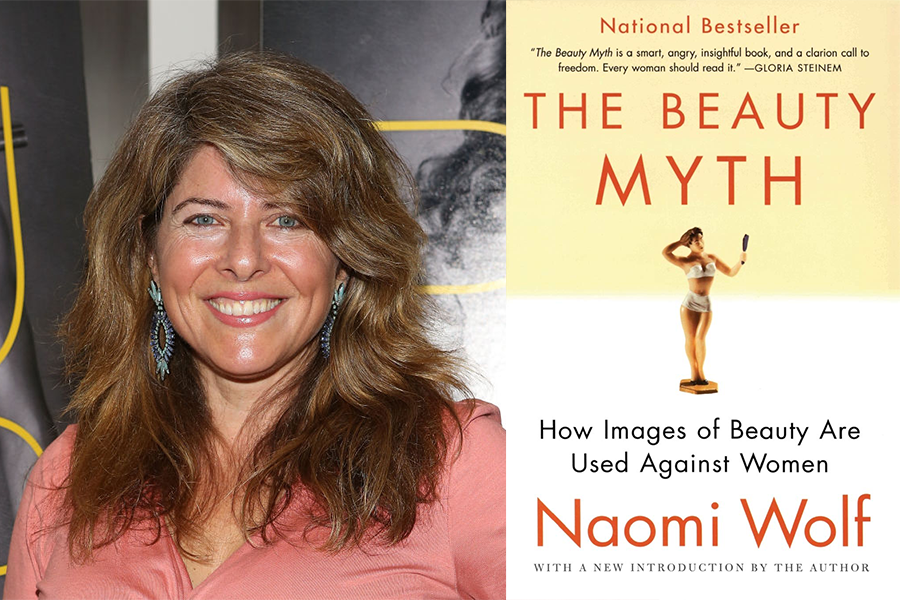Jillian Parks (JP): I saw recently you went to CPAC and, as per your Substack, you had a really great time. I would love to hear about your experience interacting with more conservatives in the past few years.
Naomi Wolf (NW): I’ve always liked going everywhere I can. I never responded to or identified with the idea that there are people or places that one shouldn’t go, especially as a journalist. You should go everywhere, talk to everyone, and learn everything that you can.
As a lifelong member of the left, most of what you read about the kinds of people who go to CPAC or events like CPAC is very damning. That turns out to be quite skewed or biased. For example, as I mentioned in my Substack essay, I’m Jewish, so I don’t like Nazis. But I did not see or hear anyone or anything that would have identified as Nazis. Clearly, they were there because NBC found them, but in my experience NBC would have to look pretty hard—and rather than doing what I would consider to be a journalistically accurate and balanced description of CPAC, that is now their story.
I see that tactic over and over and over with any conservatives, let alone Trump supporters. They’ll find that one lunatic or that one hater and amplify that.
I described the CPAC scene as pretty diverse. No one asked me if I was voting for President Trump. It’s like, whatever you think, we’re happy to have you; here’s what we think about the Constitution. Very friendly, very multigenerational. I’m sure there are people there with whom I disagree about specific things, but I really liked it.
It felt very civilized in a way, and I don’t mean ideologically. I remember the America in which young people had something to look forward to and were wanting to build lives that were not chaotic and degenerate. We were able to discuss our differences pleasantly. That’s an America that I remember and that I cherish, and it’s been shattered for the last few years.
The other thing that was valuable was the community. I think, in a time after lockdowns and Zoom calls, it’s very valuable and wonderful to have human interaction, especially in the freedom movement. People are so scattered, and one of the tactics of the bad guys is to make us feel that we’re all alone or that we’re crazy. Then you meet 25 incredible, highly educated or highly competent people who have changed the world in a number of different ways, and they’re all in the same space—it has a very reinforcing effect.
And that’s been true of every movement, going back to the founding of our nation. There were taverns where people who wanted to resist the British would gather and small networks of people who knew each other, and that became the founding of our nation.
JP: Conservatives have been enjoying your perspectives on immigration, COVID-19, and freedom of the press. Do you think that this newer audience could benefit from reading some of your earlier works like The Beauty Myth and Promiscuities?
NW: Well, gosh, what writer is going to say that anyone shouldn’t read their earlier work? So, of course, everybody should rush out and buy all my earlier works and read them.
Just like I started this interview by saying everyone should read everything and talk to everyone and be open-minded—that’s my view. I do think that conservatives also have their echo chamber, just like people on the left do, and media that reinforces certain beliefs that would benefit from being interrogated by people who don’t agree or have a different perspective. That’s why I love debate in America: free speech. That’s how you get better. That’s how we evolve, by bringing different points of view together.
That said, on reflection, I might want to revise or issue new introductions to some of my books because I’ve rethought some of the things that I believe.
I think The Beauty Myth is pretty relevant still, even though things have changed. If I were to write an introduction to that, I would include the fact that I think there’s a war on beauty now. The problem when I wrote it was everyone was expected to be pin thin and blonde, 19 years old and six feet tall and have breast implants. Now, as I wrote in my essay [about CPAC], I think many of the young women there were like, I will not be erased, I’m wearing my high heels. I am a woman. There’s a kind of womanly pride in embracing things that have been erased or marginalized as being too feminine.
In Promiscuities, scientifically all women respond to all genders—that’s just brain science. And it’s not true for men. And I think that’s really interesting, but a certain percentage of men in the population are gay, and a subset of them are bisexual, and that’s brain science. So if I were to choose an argument with people at CPAC: because gender ideology is a very vague term and can be disruptively vague on both sides—in some ways, it’s been amplified inorganically on the left and the right—I would want people who are so upset about transgender issues to do a better job at distinguishing between the horrors of minors being propagandized or encouraged to have life-changing surgery or hormones for the rest of their lives versus, if you’re going to be a libertarian movement, I think adults should be free to dress however they want.
It’s complicated, and kind of annoying linguistically, but I don’t have a problem with pronouns as long as no one’s forcing anyone to use a certain pronoun. An essay I haven’t written is how the transgender movement and the LGBTQ movement used to be a very libertarian movement, and it’s been co-opted into kind of a Marxist movement. That’s not organic to the movement.
So when conservatives just say “trans things,” then everyone who believes in equal rights for people of all sexual orientations, or people who think they are the other gender or identify with the other gender, are unnecessarily put off. Because if we drilled down most of those conservatives, they really are focused on the truly horrible things, and they usually don’t have a problem if someone wants to wear earrings or wants to say they’re Bill or whatever.
There was one other issue that I find problematic: church–state separation. That’s very important. And immigration. There’s so much to criticize about the open border. But when I talk about the border, I always say, I’m a daughter of immigrants; I’m a granddaughter of immigrants; I have nothing against legal immigration. I think that’s a very important caveat because it’s easy for critics of the conservative movement to dismiss hardcore conservatives as racist or anti-immigrant as a kind of white supremacist thing, and that’s not what it is at all. I didn’t see any white supremacy there; I don’t even know what it is. I didn’t see people saying that America needs to be white. I saw people saying, our border is open and the laws are being broken, and we don’t have sovereignty, which is very different.
JP: When The Beauty Myth first came out, some reviews criticized your work back in the 1990s for being too “white liberal feminist,” not intersectional enough. What was your response to it back in the ’90s? How do you feel about it now? Did you see the seeds of a more close-minded left back then?
NW: Jillian, that is an awesomely well-informed question. I appreciate it.
You know, it’s funny, I was probably not much older than you when The Beauty Myth came out. I was 26. And I remember that when I went to Swarthmore, a group of white girls—of course—boycotted my visit because I was not inclusive enough. Specifically, I wasn’t being inclusive because I was writing when there are people who are illiterate.
Moving from that into my second book—which is actually out of print, but it’s pretty timely again—called Fire With Fire . . .
JP: I just finished reading that.
I started out as a humanist and I remain a humanist, meaning, especially for writers and creative people, the individual perspective transcends demographics.
NW: Well, fantastic—thank you. You know, I was criticized for having a white middle-class point of view, and this was before the invention of the word “intersectionality.” I agree that everyone should speak and that curricula should be meritocratic. And there is a solid critique to have been made—I think it’s been pretty thoroughly made—of inherent bias of an all-white canon. I think it’s good to be aware and self-scrutinizing of inherent bias when you get together in a group of white women, middle-class women, or black women, or disabled women. It’s good to be self-aware that one’s life circumstances can color one’s perspective.
That said, I started out as a humanist and I remain a humanist, meaning, especially for writers and creative people, the individual perspective transcends demographics. I was always careful in my books to say, if it’s white women, if it’s middle-class women, I say middle-class women. My books are very theoretical, so I’m talking about things that are culturally true of large segments of society, right, but not everybody.
The left has managed to create a kind of bear trap, a minefield for writers. You’re not supposed to engage in cultural appropriation. You can’t speak for groups that are not your own demographic group, but if you leave anyone out, you get criticized for leaving people out. It’s an impossible conundrum.
I think it’s intentional from these outside forces that are trying to damage our culture, because then writers feel totally inhibited. And I’m going to tell you how, as a young writer, the worst thing for your voice is to feel self-conscious or inhibited or scared when you write. Obviously, you can edit out any unconscious bias after you’ve written or problematize it or highlight it. But you shouldn’t sit down at a desk in a state of fear. That’s what closed societies like to do to writers.
I always rejected it because I was always very careful to say, “this is my experience, these are my friends’ experiences, we’re white middle-class girls.” And by the way, I started culturally middle class, but we had very little money. We were more working-class economically, and there have been times as an adult, as a single mother, when again, economically, I was barely scraping by. I think that the labels that come with intersectionality often are reductive. They’ll reduce someone to all race, if they’re a person of color, and ignore the fact that they may have incredibly wealthy, aristocratic families going back to black aristocracy, three generations, like one of my friends in college. They’ll assign the role of a middle-class, privileged, white woman and ignore the fact that Jews have been considered not white in this country until quite recently.
Everyone’s story is much more complicated than those labels. And when you reduce people to those labels, I don’t think you’re learning anything constructive about people. A lot of people who are people of color or women, or minorities of various kinds, are starting to feel oppressed by these labels and want to be seen as individuals again.
I think it’s very salutary if I miss something as a white woman—or someone with economic privilege now that many people don’t have—I want to be aware of it, I want it pointed out. But once people have that basic ability to be self-critical, I really think we have to tell our individual stories. If you draw conclusions about your friends, based on where you come from, and you make it clear that you’re talking about your friends, you’re not talking about every 21-year-old in America. I think that is totally legitimate.
JP: I wanted to ask a question concerning the modern conversation surrounding gender. Do you think we’ve gotten better or worse at some of the ideals that you laid out in your earlier works? And in the 21st century, why is it so difficult to say what a woman is?
NW: Wow, these are great questions. In some ways, we got better, and in some ways, we’ve gotten worse, right? What’s really better is that men and women can be friends now. In the early ’80s, they really couldn’t be friends. I mean, certainly not heterosexual men and women. There was too much baggage. It was very, very rare. I think awareness of rape and sexual assault, date rape, is much better than it used to be. And prosecutions are maybe a little bit better. I think the level of shame that young women feel, that issue has healed a lot. I’m not saying young women don’t feel shame if they’re raped or molested. But it’s in a context where they know there’s a discourse that says, This is not you that did this, this is this bad guy or this bad person. I would say this is a good thing.
I think that people are less—and I may lose audience members—but people used to have very rigid ideas about human sexuality, and yes, that can go too far. Yes, society can collapse if everything is anarchy. But I think there’s less stigma if a woman sleeps with a woman or a man sleeps with a man, and again, I think I’m quite conservative in this area, but as long as people treat each other respectfully and tell the truth and don’t treat each other in a demeaning way . . . I do like and support families and children and raising children, but I think it’s good that there’s less stigma around same-sex relationships. I think there’s more awareness of anorexia and bulimia, though I don’t think we’ve statistically gotten better.
So all these things are good. There’s so much that’s bad—like this idea of what a woman is has really been manufactured in the last three or four years. And, again, I’m certain it’s an outside force: the kind of conversations we’re having are not organic to American culture. Like trans women, that word itself is a new coinage. I’m writing an essay about this. When I was younger, it was “transsexual” or “transvestite.” Transsexual replaced transvestite, but what is “trans”? It’s completely open-ended. It’s a new coinage. So the cultural reality, until recently, was that men who wanted to dress and identify as women were incredibly respectful of women’s culture. They loved it. This aggressive, very masculine colonizing of women’s culture is not organic to the transgender movement; I don’t think it is. I think it’s being funded or amplified by people who are trying to wreak havoc on our society, and there is a war against biological women. This is part of it.
I think other things are also a part of that. I think fashion right now, which is so Marxist for women, is part of it. But what I’m seeing with “birthing people”—and the fact that no feminist health organization stepped forward to say, wait a minute, you know men don’t lactate, and it’s not as good for the baby, and what are you doing?—that is an intentional scrambling of common sense and the most fundamental binary. A tiny percentage of people are born intersex, but otherwise, people are born male or female. And even if they have surgery, and hormones, they’re not transitioning to the other gender because their brains are still male or female; their bodies are still fundamentally male or female. Their processes are altered by hormones, but you can tell a male or female skeleton 1,000 years after the fact. We’re going to look back on the notion right now that you can change gender as a bizarre hallucination, because you really can’t change gender.
I will leave it there except to say that what it’s creating are situations that feminists in my generation—and I really never wanted to wade into this because it’s such a minefield, because my biggest wish is just for people to enjoy whatever they’re going to do, no one to judge anyone, dress however you want, right—but it is intentionally creating situations where women are putting themselves in physical jeopardy. And that is someone’s goal, and it’s not trans people’s goal organically. I don’t believe that.
So, you know, obviously I care about women. I care about women’s sports. I care about young women. Do I want you to have to worry or feel unsafe when the biggest issues women face are sexual assaults, sexual harassment, voyeurism, physical intimidation, physical harm? No. But I do think a more nuanced conversation about these issues is really important. Right now, some people on the right are kind of universally condemning people who identify as the other gender or whatever. And many people on the left are doing this reflexive, Well, I have to accept everything. So I’ll accept a gigantic man competing with a tiny 12-year-old, right? Or changing in a dressing room with a tiny 12-year-old?
What’s good in America is when people talk to each other and create some common sense and some balance.














